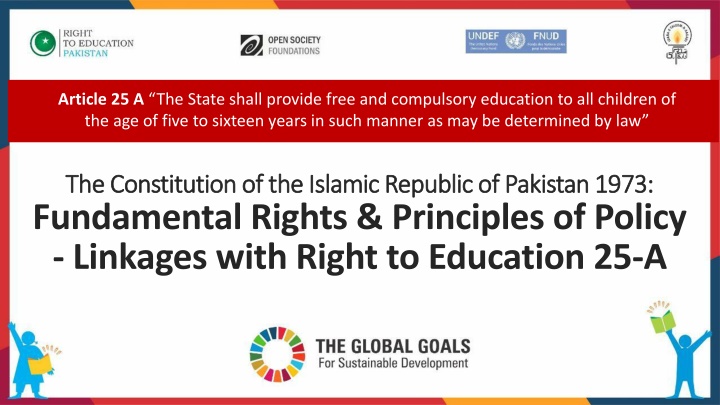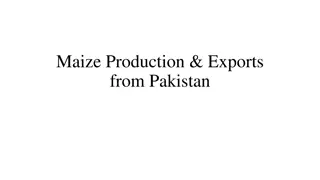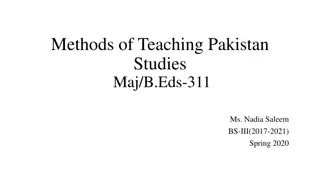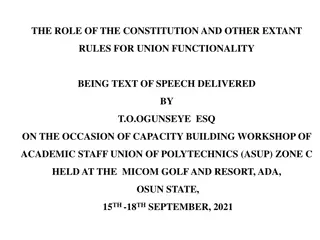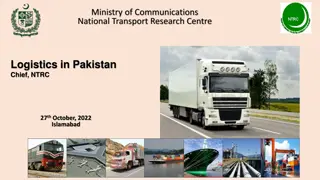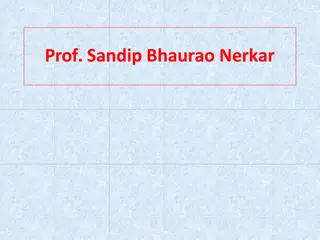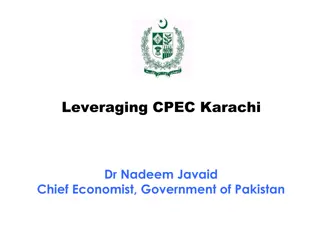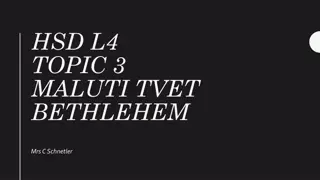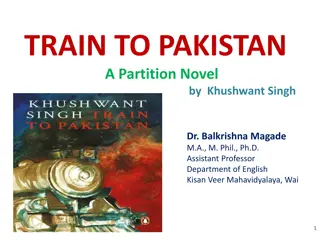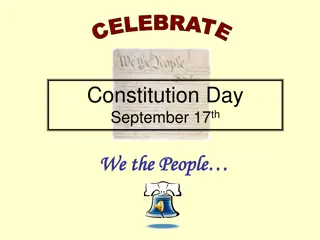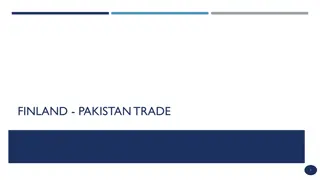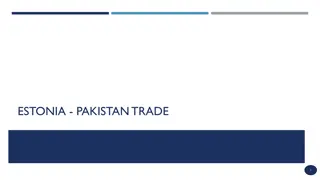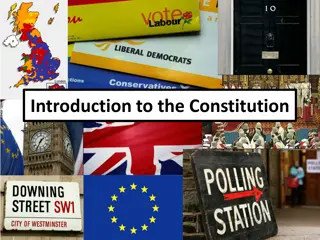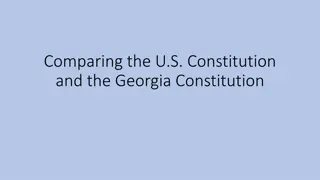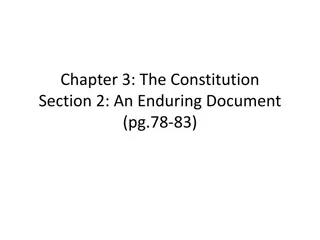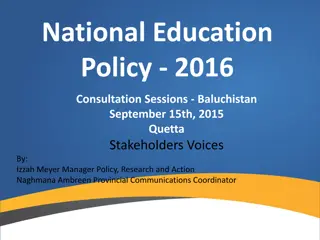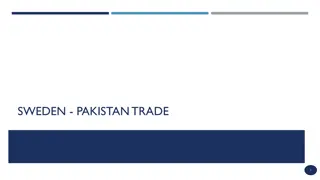Right to Education in the Constitution of Pakistan
The Constitution of the Islamic Republic of Pakistan 1973 mandates free and compulsory education for all children aged five to sixteen. Article 25-A outlines this fundamental right, emphasizing the state's responsibility to provide education in accordance with the law. The link between Article 25-A and fundamental rights and principles of policy is crucial for understanding education as a comprehensive human and constitutional right.
Download Presentation

Please find below an Image/Link to download the presentation.
The content on the website is provided AS IS for your information and personal use only. It may not be sold, licensed, or shared on other websites without obtaining consent from the author.If you encounter any issues during the download, it is possible that the publisher has removed the file from their server.
You are allowed to download the files provided on this website for personal or commercial use, subject to the condition that they are used lawfully. All files are the property of their respective owners.
The content on the website is provided AS IS for your information and personal use only. It may not be sold, licensed, or shared on other websites without obtaining consent from the author.
E N D
Presentation Transcript
Article 25 AThe State shall provide free and compulsory education to all children of the age of five to sixteen years in such manner as may be determined by law The Constitution of the Islamic Republic of Pakistan 1973: The Constitution of the Islamic Republic of Pakistan 1973: Fundamental Rights & Principles of Policy - Linkages with Right to Education 25-A PREPARED BY: SAIF QUADRI
Juxtaposing 25 A RTE with Fundamental Rights and Principles of Juxtaposing 25 A RTE with Fundamental Rights and Principles of Policy Policy The Links Are Critical to Understanding 25 A as a comprehensive Human & Constitutional Right Principles of Policy Fundamental Rights 25 A RTE The State shall provide free and compulsory education to all children of the age of five to sixteen years in such manner as may be determined by law.
Constitution of the Islamic Republic Of Pakistan 1973: Part II-Fundamental Rights and Principles of Policy Chapters 1 and 2 Articles 7 - 40 Article 7 Definition of the State In this Part, unless the context otherwise requires, "the State" means the Federal Government, [Majlis-e-Shoora (Parliament)], a Provincial Government, a Provincial Assembly, and such local or other authorities in Pakistan as are by law empowered to impose any tax or cess. http://www.pakistani.org/pakistan/constitution/part2.ch1.html
Fundamental Rights Part II-Chapter 2 Articles 7-28 http://www.pakistani.org/pakistan/constitution/part2.ch1.html 19. Freedom of speech, etc. 19A. Right to information. Freedom to profess religion and to manage religious institutions Safeguard against taxation for purposes of any particular religion Safeguards as to educational institutions in respect of religion, etc Provision as to property Protection of property rights Equality of citizens 25A. Right to education Non-discrimination in respect of access to public places Safeguard against discrimination in services Preservation of language, script and culture 8. Laws inconsistent with or in derogation of fundamental rights to be void. 20. 9. Security of person 10. Safeguards as to arrest and detention 10A. Right to fair trial 21. 22. 11. Slavery, forced labour, etc., prohibited 12. Protection against retrospective punishment 23. 24. 25. 13. Protection against double punishment and self- incrimination 14. Inviolability of dignity of man, etc. 26. 15. Freedom of movement, etc. 16. Freedom of assembly 27. 17. Freedom of association 28. 18. Freedom of trade, business or profession
Fundamental Right How it links to 25-A 9. Security of person No person shall be deprived of life or liberty. Liberty defined as each of those social and political freedoms which are considered to be the entitlement of all members of a community - Oxford English Dictionary Acquiring education is a social freedom and thus a right of all members of the community. 11. Slavery, forced labour, etc., prohibited (2) All forms of forced labour and traffic in human beings are prohibited (3) No child below the age of fourteen years shall be engaged in any factory or mine or any other hazardous employment. No child must be forced to engage in any sort of work, dangerous or otherwise, especially in lieu of acquiring education. 14. Inviolability of dignity of man (1) The dignity of man and, subject to law, the privacy of home, shall be inviolable. Right to receive a quality education strongly linked to personal dignity, and denial of same could be considered violation of personal dignity.
Fundamental Right How it links to 25-A 15. Freedom of movement Every citizen shall have the right to remain in, and, subject to any reasonable restriction imposed by law in the public interest, enter and move freely throughout Pakistan and to reside and settle in any part thereof. Therefore, all citizens 5-16 have a right to acquire education in any region of Pakistan, provided they are resident in that region. 16. Freedom of assembly Every citizen shall have the right to assemble peacefully and without arms, subject to any reasonable restrictions imposed by law in the interest of public order. This can apply to schools and other forms of educational institutes. Right of students and teachers and educational staff to assemble/protest in case of unfair treatment. 17. Freedom of association (1) Every citizen shall have the right to form associations or unions, subject to any reasonable restrictions imposed by law in the interest of sovereignty or integrity of Pakistan, public order or morality. Students/teachers allowed to form unions, take collective action, organize, etc.
Fundamental Right How it links to 25-A 18. Freedom of trade, business or profession Subject to such qualifications, if any, as may be prescribed by law, every citizen shall have the right to enter upon any lawful profession or occupation, and to conduct any lawful trade or business. Receiving a quality education often a prerequisite for professional work, trade, business. Right to work in the field of education. 19. Freedom of speech, etc. 19A. Right to information Every citizen shall have the right to freedom of speech and expression subject to any reasonable restrictions imposed by law ; Every citizen shall have the right to have access to information in all matters of public importance subject to regulation and reasonable restrictions imposed by law. Teachers and students allowed to freely express views and opinions in schools. Allowed to access public information that would complement education.
Fundamental Right How it links to 25-A 22. Safeguards as to educational institutions in respect of religion, etc. (1) No person attending any educational institution shall be required to receive religious instruction if such instruction relates to a religion other than his own. (3) (a) no religious community shall be prevented from providing religious instruction for pupils of that community in any educational institution maintained wholly by that community (b) no citizen shall be denied admission to any educational institution receiving aid from public revenues on the ground only of race, religion, caste or place of birth. (4) Nothing in this Article shall prevent any public authority from making provision for the advancement of any socially or educationally backward class of citizens. This article deals with the right to education pertaining to religion and religious communities. 24. Protection of property rights (1) No person shall be compulsorily deprived of his property save in accordance with law. Private educational institutions and their ownership covered under this article.
Fundamental Right How it links to 25-A 25. Equality of citizens 25A. Right to education (1) All citizens are equal before law and are entitled to equal protection of law. (2) There shall be no discrimination on the basis of sex (3) Nothing in this Article shall prevent the State from making any special provision for the protection of women and children. The State shall provide free and compulsory education to all children of the age of five to sixteen years in such manner as may be determined by law. 26. Non-discrimination in respect of access to public places (1) In respect of access to places of public entertainment or resort not intended for religious purposes only, there shall be no discrimination against any citizen on the ground only of race, religion, caste, sex, residence or place of birth. (Could apply to access to educational institutions?) 28. Preservation of language, script and culture any section of citizens having a distinct language, script or culture shall have the right to preserve and promote the same and subject to law, establish institutions for that purpose. Right to receive education in regional languages; curriculums to take local, regional cultures into account?
Part II Part II- -Chapter 2: Principles of Policy Chapter 2: Principles of Policy Articles 29 Articles 29- -40 40 29. Principles of Policy 30. Responsibility with respect to Principles of Policy. 31. Islamic way of life. 32. Promotion of local Govt institutions. 33. Parochial and other similar prejudices to be discouraged 34. Full participation of women in national life. 35. Protection of family life, etc. 36. Protection of minorities. 37. Promotion of social justice and eradication of social evils. 38. Promotion of social and economic well-being of the people. 39. Participation of people in Armed Forces. 40. Strengthening bonds with Muslim world and promoting international peace. http://www.pakistani.org/pakistan/constitution/part2.ch2.html
31. Islamic way of life. (1) Steps shall be taken to enable the Muslims of Pakistan to order their lives in accordance with the fundamental principles and basic concepts of Islam and to provide facilities whereby they may be enabled to understand the meaning of life according to the Holy Quran and Sunnah. (2) The state shall endeavour, as respects the Muslims of Pakistan :- (a) to make the teaching of the Holy Quran and Islamiat compulsory, to encourage and facilitate the learning of Arabic language and to secure correct and exact printing and publishing of the Holy Quran; Right to receive religious education, based on Quran and Sunnah, for all Muslim children. 32. Promotion of local Govt institutions. The State shall encourage local Government institutions composed of elected representatives of the areas concerned Related to provision of educational services at local level. 33. Parochial and other similar prejudices to be discouraged The State shall discourage parochial, racial, tribal, sectarian and provincial prejudices among the citizens. Right to receive education in an environment free of prejudices, biases and bigotry.
Principle of Policy How it links to 25-A 35. Protection of family life, etc. The State shall protect the marriage, the family, the mother and the child. A quality education could result in a better family life in the long run. 36. Protection of minorities. The State shall safeguard the legitimate rights and interests of minorities Right to quality education for all minority children. 37. Promotion of social justice and eradication of social evils. The State shall: (a) promote, with special care, the educational and economic interests of backward classes or areas (b) remove illiteracy and provide free and compulsory secondary education within minimum possible period (c) make technical and professional education generally available and higher education equally accessible to all on the basis of merit (f) enable the people of different areas, through education, and other methods, to participate fully in all forms of national activities Strong links with Right to Education (all levels), inclusive of children from vulnerable backgrounds.
Principle of Policy How it links to 25-A 38. Promotion of social and economic well-being of the people. The State shall : (a) secure the well-being of the people, irrespective of sex, caste, creed or race, by raising their standard of living Acquiring education a path to better standard of living (d) provide basic necessities of life, such as food, clothing. housing, education and medical relief, for all such citizens as are permanently or temporarily unable to earn their livelihood on account of infirmity, sickness or unemployment Provision of education for the sick and the vulnerable. 40. Strengthening bonds with Muslim world and promoting international peace. The State shall endeavour to preserve and strengthen fraternal relations among Muslim countries based on Islamic unity, support the common interests of the peoples of Asia, Africa and Latin America, promote international peace and security, foster goodwill and friendly relations among all nations and encourage the settlement of international disputes by peaceful means. Could be linked with cooperation with Islamic world + other regions in education sector.
Extending 25 A for Higher Education In Court Cases Extending 25 A for Higher Education In Court Cases- - Kiran Kiran Shahzadi Shahzadi vs.Quaid vs.Quaid- -e e- -Azam Azam University (2011) University (2011)
